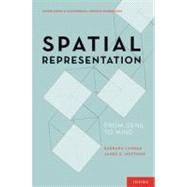- ISBN: 9780195385373 | 0195385373
- Cover: Hardcover
- Copyright: 9/20/2012
Our experience of the spatial world is a unitary one; we perceive objects and layouts, we remember them and act on them, and we can even talk about them with ease. Despite this impression of seamlessness, spatial representations in human adults appear to be specialized in domain-dependent manner, engaging different properties and computational mechanisms for different functions. In this book, the authors present evidence that this domain-specific specialization in cognitive function emerges early in development and is reflected in patterns of breakdown that occur under genetic defect. The authors focus on spatial representation in children and adults with Williams syndrome, a relatively rare genetic syndrome that gives rise to an unusual profile of severely impaired spatial representation together with spared language. Results from a variety of spatial domains -- including object representation, motion perception, action, navigation, and spatial language -- appear to display a strikingly uneven profile of sparing and deficit within spatial representations, consistent with the idea that specialization of function drives development and breakdown. These findings raise a crucial question: Can specific genes target specific aspects of cognitive structure? Looking deeper into the patterns of performance across spatial domains, the book explores the notion that understanding patterns of normal development across domains is crucial to understanding unusual development. Using insights from normal development, the authors propose a speculative hypothesis that explains the emergence of the William syndrome profile, and how complex cognitive outcomes can arise from the deletion of a small set of genes.






